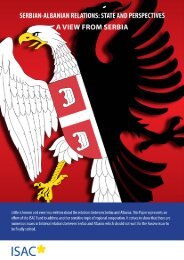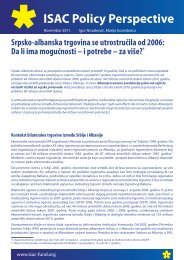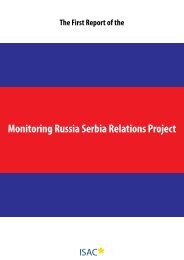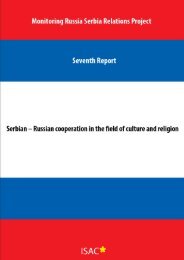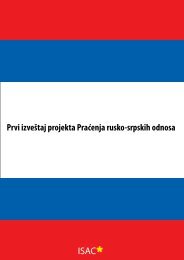On the basis of the conclusions of the World Economic Forum (I 2009), the global crisis issurely to reduce world riches by as much as 40%. The difficult situation in the internationalloan market has reflected directly on Russia and its companies, especially in the form ofdeferrals and/or stopping of numerous investment projects. The leading Russian companies,with Gazprom at the helm, do not boast today sufficient quantities of financial resourcesrequired for future investments and modernization projects, which may prove profitablewhen an oil barrel costs 100$.Gazprom has been compelled to slow down the building of the Northern and SouthernStream gas lines and also to stop a strategically important project with China - the Altai gasline 2 . The research and the speed of the activation of new oil and gas fields has beenadditionally slowed down (Shtokman field in the Barents Sea and fields in Eastern Siberia).In the past years, this company was focused on the maximization of profit, without a clearstrategy of the method of increasing production and investments in research anddevelopment. Today, when its debts amount to some 60 billion EUR, the problem with itsown capital is a serious obstacle, which additionally aggravates the taking of new loans. The"boomerang effect" which resulted from the business method itself and from whichGazprom has already been suffering will be felt in the energy offer worldwide as well(although the responsibility lies on the Russian company). Strategic goals in new economicconditions must refer to the development of new fields (gas and oil) and to themodernization of present infrastructure. Only in that way will the world be able to meet itsneeds for fuels. Therefore the initiative of the formation of a gas cartel 3 , such as OPEC, anda proposition for consideration of a new Energy Charter by Russia 4 are no cause of wonder.A joint action of all big and developed countries, without isolation, egoism or protectionism,is one of the keys to a solution to future energy issues.Energy companies, especially Russian ones, underwent in 2008 a so-called "golden fever"owing to the high prices of oil barrels. When the price of an oil barrel reached 100$, Russiaearned some 800 mil $ daily from oil and gas exports, or by 250 mil $/daily more than twoyears before. The income of exports (oil and gas) consituted 2/3 of the budget.2 With a memorandum in 2006, a construction of the Altai gas line, towards China, 2800 km in length, and30mlrd m 3 in capacity, was contracted. The expected investment is 14mlrd US$, while the deadline, instead of2011, has been shifted by 4 years at the earliest.3 The gas cartel initiated and in formation X 2008, by Russia, gathers all the countries that are the richest in gasresources - Russia, Iran and Qatar.4 European Economic Forum, Davos 2009, within which Russia launched an initiative on a new energy charter,based on the establishment of energy security. The basic vision reflects in the connection and a closer linkbetween the energy offerer and consumers. It was Putin himself that emphasizes that the world is acting as ifthe crisis had been unexpected, whereas it was "expected as the winter is expected in Russia everey year". Theresults is a "collapse of the system, a low quality of management, a poor assessment of risks and gains, oneeconomy printing money (US) and another saving it (China) and expectations guided by nothing are beingencouraged."30
The drop in the prices of oil and in the economic growth plunged Russia into the deepestcrisis in the past ten years. Although Putin first rejected the possibility of ruble devaluation 5 ,that was simply necessary. As the oil price had reached 40$/bbl (sa 147$/bbl), Russia'seconomic and energetic boom was stopped. Like many other states, recession struck Russiaas well, bringing economic and social problems. The unemployment rate keeps growing (ina month alone in 2008, 400.000 people were rendered jobless), while foreign currencyreserves keep dropping rapidly. In 2009, the budget deficit is 124,6 mlrd US$ due to a dropof oil prices. Calculated at 70$ for an oil barrel, it was redefined to a new base of 41$/bbl,and with a very low projected rate of economic growth of only 0,2% (previously planned6.7%). If it is known that oil and gas export income in 2006 constituted 50%, and a yearlater up to 70% of the Russian federal budget, then it is clear how big the blow struck on theRussian energy sector by the drop of oil prices and the crisis is. Besides, the psychologicaleffects is visible, as the Russian people remember the big economic crisis of 1998, whichwas additioanlly a political one. Russia remembers hunger, destitution, hopelessness andpoverty, a period when the ruble depreciated by as much as 75%. Today's crisis, however,has been caused both by the world crisis and a drop in oil prices and by the political and warconflict between Russia and Georgia. The export incomes dropped, but investorsadditionally took billions of dollars from the country additionally, fearing the escalation ofgeopolitical tensions with the West (due to the military conflict between Georgia andRussia).In several months alone in 2008, the stock market lost 60% of its value. Although the crisisthrived and was visible at every step, there was not much talk about it in Russia last year.Russian media and politicians looked upon the crisis as an "American problem" (researchshow that only 40% of Russian people (in mid-September 2008) were aware of the comingof a huge-scale crisis). As it especially struck industry, companies in this branch reduced thenumber of workers and the output by over 30% each 6 . Most people were left without jobs in5 „I woud not be the prime minister of devaluation“ – Putin, 2008.6 Company Magnitogorsk Iron and Steel Works dismissed 3000 workers (10% workers of Ural), and reducedthe output by 15%, while a month later it dismissed another 1300. Company Severstal (steel and mining)reduced domestic production by 25%, their production in the US and Italy was reduced by 30%. Evraz Group,one of the world largest vertically integrated companies for the production of steel and mining business, whichemploys 40,000 workers, has announced a reduction by at least 1/3 of employees and a reduction of output by50-60%.31
- Page 3: MONITORING RUSSIA SERBIA RELATIONSI
- Page 11 and 12: Economic Crisis in Russia and Its E
- Page 13 and 14: − Sufficient NGOs, including thin
- Page 15 and 16: Their opponents point out that not
- Page 19 and 20: Russian Authorities: the Decision-M
- Page 21 and 22: Medvedev towards independence may b
- Page 23 and 24: MinisterDeputy Prime Minister,Minis
- Page 25 and 26: not pay tangible dividends but they
- Page 27: In the internal policy, a tendency
- Page 32 and 33: the fields of metallurgy and financ
- Page 34 and 35: 16,5% of world gas reserves and 19,
- Page 36 and 37: As the Russian energy sector is a d
- Page 38 and 39: In 1996, two big consortiums signed
- Page 40 and 41: G-5 Russian gas reservesG-6 Gazprom
- Page 43 and 44: Two Russias: On The Two Dominant Di
- Page 46 and 47: laid itself, i.e. its own empire, a
- Page 48 and 49: In that sense, it is characteristic
- Page 50 and 51: place in the post-cold war world),
- Page 53 and 54: Myths about Russia and Dynamics of
- Page 55 and 56: the support of her advisor and civi
- Page 57 and 58: neutrality was not interrupted even
- Page 59: Russian policy on the Balkans were
- Page 62 and 63: The fanatical course of action by a
- Page 64 and 65: of interest and influence to the se
- Page 66 and 67: It did not have any official policy
- Page 68: Milošević himself assessed in his





